Veterans Day
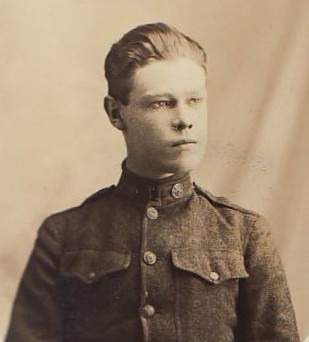
A Johnson & Johnson employee from the New York office who served in World War I
On Veteran’s Day, we remember the men and women who serve their countries, and express our appreciation and gratitude toward them. On this Veteran’s Day, Kilmer House would like to salute the many employees in the Johnson & Johnson Family of Companies throughout our history who have served in the armed forces, starting over 100 years ago with the Spanish American War in 1898.
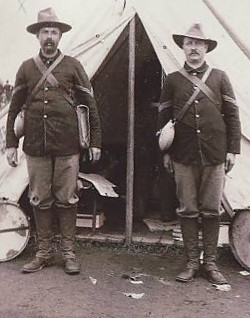
Two soldiers in the Spanish American War, 1898, from our archives. The man on the left was an employee in the Plaster Mill.
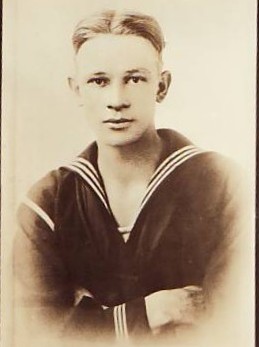
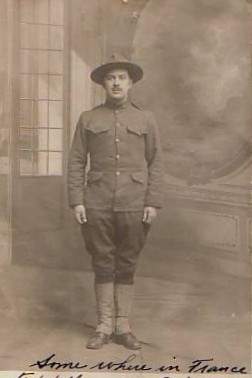
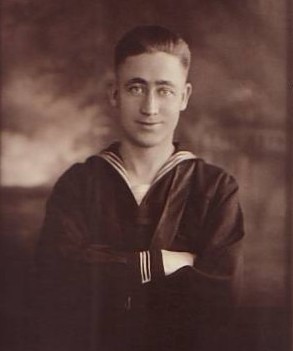
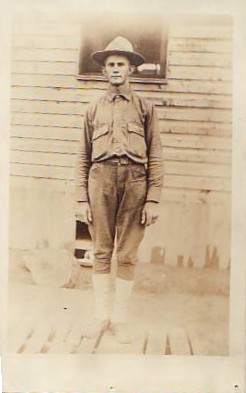
Some employee veterans of World War I, from our archives
Many of our employees served in World War I, and a number of them wrote letters to Fred Kilmer and their colleagues and sent pictures back from the front. This post has excerpts from some of the letters our employees sent from France back to New Brunswick.
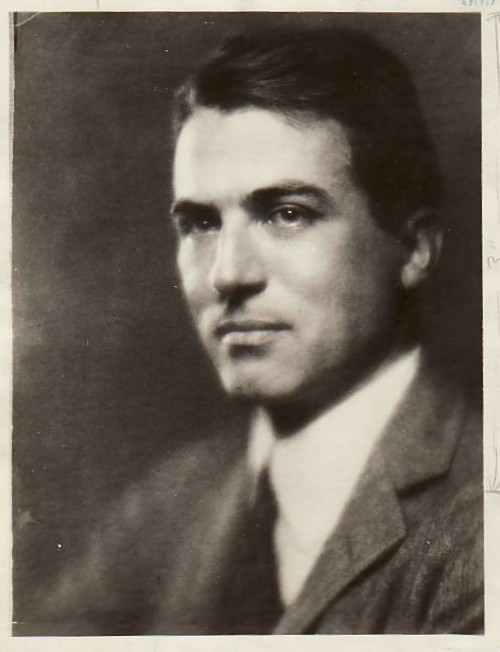
Seward Johnson
Seward Johnson, one of the sons of Company founder Robert Wood Johnson the first, served on a submarine chaser in the U.S. Navy during World War I. Submarine chasers were small, heavily armed boats that were designed to pursue and neutralize the German U-boats, or submarines that caused such heavy losses to shipping during the war.
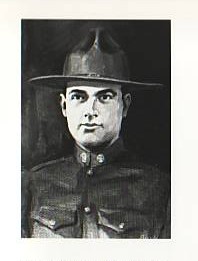
Joyce Kilmer
The most famous veteran with a connection to Johnson & Johnson was Scientific Director Fred Kilmer’s son, poet Joyce Kilmer -- the author of “Trees” and “Rouge Bouquet,” among other works. Although Joyce wasn't an employee of Johnson & Johnson, he wrote or contributed to some of the Company's early publications. Joyce Kilmer was killed on July 30, 1918, during a scouting mission in the final days of World War I. He was posthumously awarded the Croix de Guerre by the French government. If anyone is interested in learning more about Joyce Kilmer, this excellent site by his granddaughter has more information.
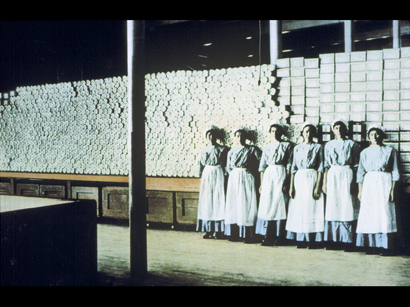
Employees standing in front of absorbent cotton products, circa World War I, showing some of the enormous output the Company produced.
In 1918 Robert Wood Johnson (later known as General Johnson) became the General Superintendent of Manufacturing for Johnson & Johnson, and oversaw the production of the huge quantities of sterile dressings, gauze, and other medical products to treat soldiers fighting in Europe in World War I. To keep up with demand, Johnson & Johnson was running shifts around the clock to supply the Allied forces, as well as hospitals in the U.S. and in Europe. When demand exceeded even the Company’s around the clock efforts, a search began for a new source of textiles, which led in 1916 to the acquisition of the Chicopee Manufacturing Company of Chicopee Falls, Massachusetts. Very quickly, the entire spinning and weaving output of Chicopee was soon on its way to New Brunswick to be made into surgical dressings and other medical supplies.
The War Department awarded Johnson & Johnson a special commendation for its outstanding performance during World War I, and the head of the American Food Administration, Herbert Hoover praised the Company for its support of the food conservation campaign that was part of the war effort.
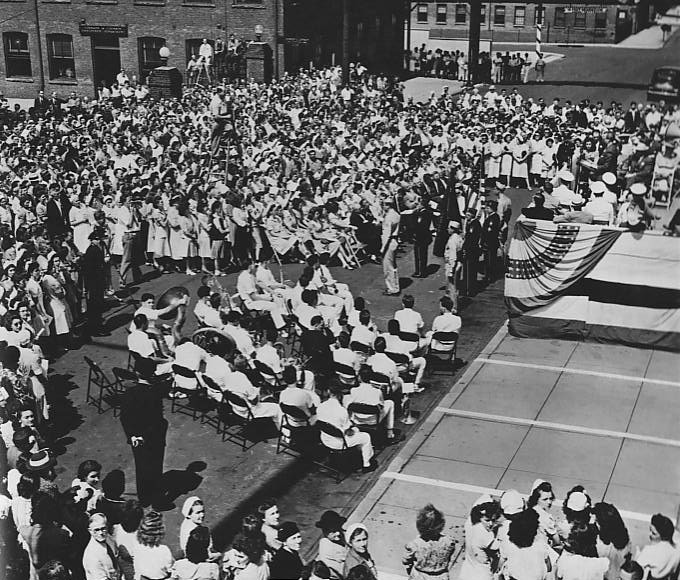
War Bonds Rally at Johnson & Johnson, 1940s
The Company broke its own production records during World War II, when it again was called on to produce surgical dressings and other medical supplies to help soldiers, and other products for the war effort. (The Company’s Industrial Tape Corporation even started producing a new special waterproof tape for the war effort. It was initially called “duck tape”...before its name evolved into the more familiar duct tape!)
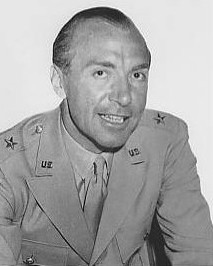
General Robert Wood Johnson in uniform when he was head of the Smaller War Plants Corporation during WWII
Company president Robert Wood Johnson entered the army as a colonel with the Ordnance Department to use his business skills in the procurement of war materials. He was then appointed by President Franklin Delano Roosevelt to head the Smaller War Plants Corporation, and elevated to the rank of brigadier general. (Johnson served only for several months, but the title of “General” stuck with him for the rest of his life.) Aside from the few employees pictured here from our archives, many employees of the Johnson & Johnson Family of Companies have been veterans...and many are today. As everyone celebrates Veterans Day today, Kilmer House salutes the men and women of the Johnson & Johnson Family of Companies who have served their countries throughout the Company's history.
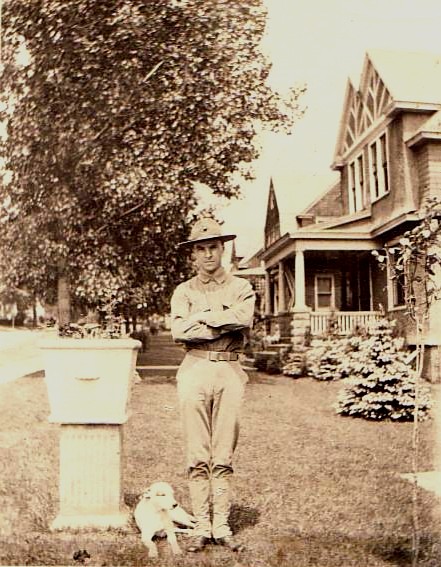

On the 11th Day of the 11th month each year, Americans come together to honor those in uniform, the ones who sacrificed for our nation, on Veterans Day. As a veteran of the Iraq and Afghanistan, War on Terror, I urge everyone to take this day to not just thank a veteran, but to talk with veterans. Learn about how our experiences have shaped our lives and what issues we face as we make our transitions back to civilian life. I would like to explain my side of the story, my own experience.
When I joined the military I was a young, confused kid, who did not know much about life, due to being sheltered for most of my life by my over protective parents. I did not know much about the war, just that I was enraged at the hatred those terrorists had for all Americans and me. I wanted to help my country, to protect it at all cost, even giving up my life to do so. It may sound funny but when I initially tried to enlist in the military, I was to be a military post-man, but the job had already been taken. Since I am color-blind, I wasn’t able to have a range of opportunities in the military. My placement was therefore in Mortuary Affairs Specialist. I felt that I grew up quicker in my years in service than most people do in their whole lifetime.
I was nineteen years old on February 8th, 2002. It was kind of cold for Phoenix as I reached the Airport headed to Fort Jackson, in South Carolina for basic training. Upon reaching Fort Jackson, referred by some in the service as relaxant Jackson, I found that the life I had chosen would not be as easy as I thought. Those first couple of days I got a hair cut, issued uniforms, and learned the waiting line for training was long. During this time, since 9/11, there was a mass influx of new recruits; the Army had problems finding them units to train in. For me I was lucky kind of, since I had a school date that did not come around very often, they tried to offer me another job, but I turn them down, I was shipped from Fort Jackson, then to Fort Lenderwood Missionary. The Ozark Mountains are cold and during winter, it was unbearable. It was an extreme change for me because I was mostly familiar with the hot weather in Phoenix, AZ. Exercising and running in extreme weather with being out shape was horrible. There was no special treatment for anyone but the drill sergeants made me work twice as hard. The treatment I received was something similar to a movie, where the fat kid got picked on and abused, but it was some thing I needed in order to become who I need to be. Despite this, I worked hard, did everything I was ordered to do, and eventually I graduated from boot camp with a new physique. During graduation, my fellow recruits honored me with “The Most Changed Person” reward, the Order of the Dragoon.
I was off to my next challenge, training for my MOS. When I reached Fort Lee, Virginia, I missed my start date and had to wait for the next one. This meant that I couldn’t get a pass to go anywhere; I had to just sit at the barracks, clean the floors, and do KP duty. After awhile this routine got incommodious. I was so happy on Memorial Day 2002, because the next day I was scheduled to start school. Then all of a sudden, I had horrible stomach pains, and could not figure what it was. So I was sent me off to the ER, the doctors initially diagnosed appendix problems. The one-hour surgery was then scheduled immediately, however it took five hours to complete. Apparently, my appendix had been ruptured for over a month including basic training. The surgeons said I am so lucky to be alive. I got a month off to recover and relax. When I got back to Fort Lee, I had to wait another month for class, so eventually when I got to school; I did my best to learn about my job and almost graduated at the top of my class. The reason why I did not graduate at the top of my class was due to my stomach muscles not fully recovering, which made doing sit-ups very hard. I did it because I wanted to join my unit at Fort Lee.
My feelings of excitement and wanting to serve were still in tact even after months of prolong waiting and recovery. In order to be all that I could be, to be the best, I exceed my own abilities by 120%. The mindset I had, came a long way (physically from Phoenix and mentally from the first story I heard about the terrorist attacks), I had really changed for the better. In the first year, I received my first (minor) medal, the Army Achievement Medal. With this acknowledgement from the Army, I wanted to speed up my deployment overseas to Afghanistan, but that wasn’t going to happen until March 18th 2003. According to orders, my team that I was assigned to from my unit wasn’t schedule to arrive in Iraq first. Instead, I worked in the Theater Mortuary Affairs Evacuation Point, a place that went nonstop for the first three months.
Sleep was limited to when I did not hear a helicopter, and when body’s slowed down coming in. In the states I had worked at the Richmond Morgue, but war was different. Instead of just seeing some one you did not know in the states, in Kuwait you learn to know every one, due to them wearing the same uniform, and inventorying all their personal effects, you knew who they wear when they left. Not only was our job to process Americans, but we also helped process British, and any other Allies. During this time I saw the mistakes we made, such as shooting British helicopter down with Sam missiles, and killing Brazilin journalist when we hit the wrong building, during that time I saw the horrors that mankind was possible of. I start experiences, problems, and tried to seek medical help, but I was deferred and told I would be fine. My excitement had come to an end, and I start to get in trouble, pretty soon my 1st Sgt, thought that I was not experiencing enough of the war, so he sent me to the Iraq, Camp Alsad. In Camp Alsad, was slow, but became difficult. Some of the soldiers I ate with at the chow hall, and knew were head on a rest and relaxation mission, but instead of making it, their helicopter was shot down. My team had to go clean the site, recover the bodies, and inventory their belongings. Man life is tough, but even tougher if you know the people. There were two other tough missions. The first were, when three Special Forces soldiers had been killed, when they were given orders not to shoot into a crowd even if they were receiving fire, not only did we have to process their bodies, but we also had to process the bodies of the people who had killed them. We are mortuary affairs first, and as such we have a moral obligation not to look at uniform, or lack of one, but to look at the person and understand their journey had come to a end, and it was our job to treat them with respect because every one has family and friends that care for them, it was not are job to judge right or wrong, which is very hard. The second tough mission was when we went with a convoy head to a site, that they had reportedly killed Sadam Husain, but in fact the compound was filled with animals and women and children. I do not think the Air Force meant to kill them, they were trying to do there job in following cell phone singles, and when they split, they went after the most likely target. On this mission two things had happened. One back in Alsad I was having bad night terrors, but the person in charge of my team figured the answer was not sending me back, but instead was to put me on night duty, and to change the location I slept on, in the location I was, this almost spelled disaster for me and my friend, when I woke up and started to scream at the top of my lungs, the people sleeping around the truck react and were about to shoot in the back of the truck, when my Sgt yelled stop he is just dreaming, oh thank god. The second thing is as I stated before, we are trained to respect the dead, and their belongings. This did not transfer to the people there, instead they were ordered to bury everything, destroy all evidence and move on. That pretty much covers Iraq.
When I got back to the states, I faced many hardships under the care of the Army. I am like millions of other veterans dealing with mental and physical scars of war. Most Americans will never know about these issues because it is not covered in the news or articles. The Army has become a two-sided issue for me; it was once a place where I wanted to succeed at being a great solider and fight for our rights and our country. Now that I came home I am still fighting another battle, however, this fight, I fight alone. I am trying to cope with sudden flashbacks, traumatizing combat events, hyper-vigilance to the recurrence of danger, feelings of numbness, low self-esteem, rage, and lapses in concentration. All of these have caused me to descend in my quality of life. I thought the Army and my unit would continue to care for me, treat me as a fellow solider, and assist me with finding resources for coping and healing. However, this was not the case, my unit classified me as a troublemaker, an unfit solider. As a result, they discharged me out of the Army abruptly without taking responsibility for the causes of my PTSD illnesses. Like other soldiers, I tried to reach out for help but once the system failed, I tried to commit suicide twice during my service. Luckily, both times, one of my few friends stopped me. This incident put me in a mental hospital involuntarily, where they doped me up on strong medicines, and no one cared to seek the reasons behind the action. I wasn’t allowed to receive my care at the Army hospital, because if procedures were followed, there would have been a long investigation and no one wanted to take the time to take care of their wounded soldiers with PTSD. Instead, I was discharged immediately with personality disorder. This seems to be the common practice for the Army, not just in my case but also 20,000 other veterans. At 5 P.M. September 16, 2004, my last official orders from the Army were, TO GET OUT!! Heavily medicated, I received my car keys, and was told to drive over 5000 miles, all the way home to Phoenix, Arizona. My feelings that proscribed afterwards are indescribable.
Even though I am still in my own body, this whole experience has shaped my life. Following my physical return home to Phoenix, AZ, I, however, didn’t return home with my state of mentality. My homecoming wasn’t what I imagined, that is because it was based on tv and movies I’ve seen about returning soldiers as hero’s. I became hospitalized time and time again.
Don’t worry, my story gets better and does have a great beginning. This new chapter in my life begins with the chance meeting the love of my life, my wife. With her continued support, I am able to handle some things on my own. A great support system, love, understanding, and patience, is what I think all soldiers should have and receive upon their return home. After all, the important issue is that we are all humans! With the good and the bad, we will always have our memories.
So on this Veterans Day and every day the best way to honor our veterans is to connect with them. So please remember and honor our fellow humans, our veterans. Without recognition from our family and friends, it doesn’t seem like all of our efforts make a difference. Many of us new veterans are being left behind, we have honored you by defending your rights, and all we ask is to welcome us home.
Sincerely,
Joshua C. Poulsen
Iraq and Afghanistan Veteran
Joshua,
Thank you for sharing your story with us. Welcome home. I wish you a happy Veterans Day and all the best of luck, health and happiness in the future.